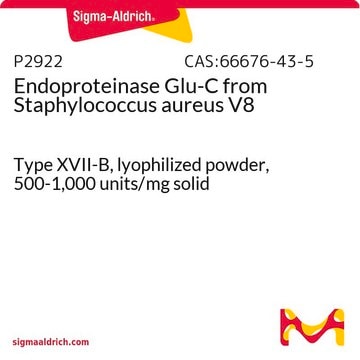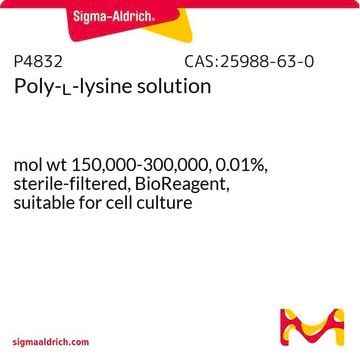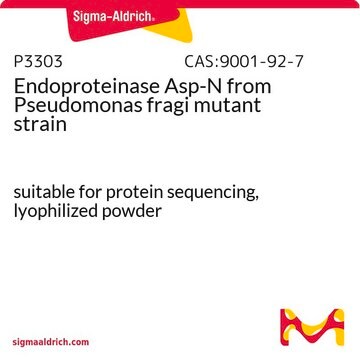P6181
Endoproteinase Glu-C from Staphylococcus aureus V8
suitable for protein sequencing, lyophilized powder
Synonym(s):
V8 Protease
About This Item
Recommended Products
grade
Proteomics Grade
Quality Level
form
lyophilized powder
analyte chemical class(es)
amino acids
suitability
suitable for protein sequencing
storage temp.
−20°C
Looking for similar products? Visit Product Comparison Guide
Related Categories
Application
- obtaining proteolytic cleavage fragments of the S-layer protein (from Bacillus stearothermophilus ATCC 12980) to perform affinity studies.
- the enzymatic cleavage of native VSTx-3 (voltage sensor toxin 3) peptide for its sequence determination.
- limited proteolysis of recombinant purified PimA (phosphatidylinositol mannosyltransferase).
- the digestion of glycosylated hemoglobin for isotope dilution liquid chromatography-tandem mass spectrometry analysis.
Biochem/physiol Actions
Signal Word
Danger
Hazard Statements
Precautionary Statements
Hazard Classifications
Resp. Sens. 1 - Skin Sens. 1
Storage Class Code
11 - Combustible Solids
WGK
WGK 3
Personal Protective Equipment
Certificates of Analysis (COA)
Search for Certificates of Analysis (COA) by entering the products Lot/Batch Number. Lot and Batch Numbers can be found on a product’s label following the words ‘Lot’ or ‘Batch’.
Already Own This Product?
Find documentation for the products that you have recently purchased in the Document Library.
Customers Also Viewed
Protocols
An optimized LC-MS/MS based workflow for low artifact tryptic digestion and peptide mapping of monoclonal antibody, adalimumab (Humira) using filter assisted sample preparation (FASP).
Our team of scientists has experience in all areas of research including Life Science, Material Science, Chemical Synthesis, Chromatography, Analytical and many others.
Contact Technical Service










